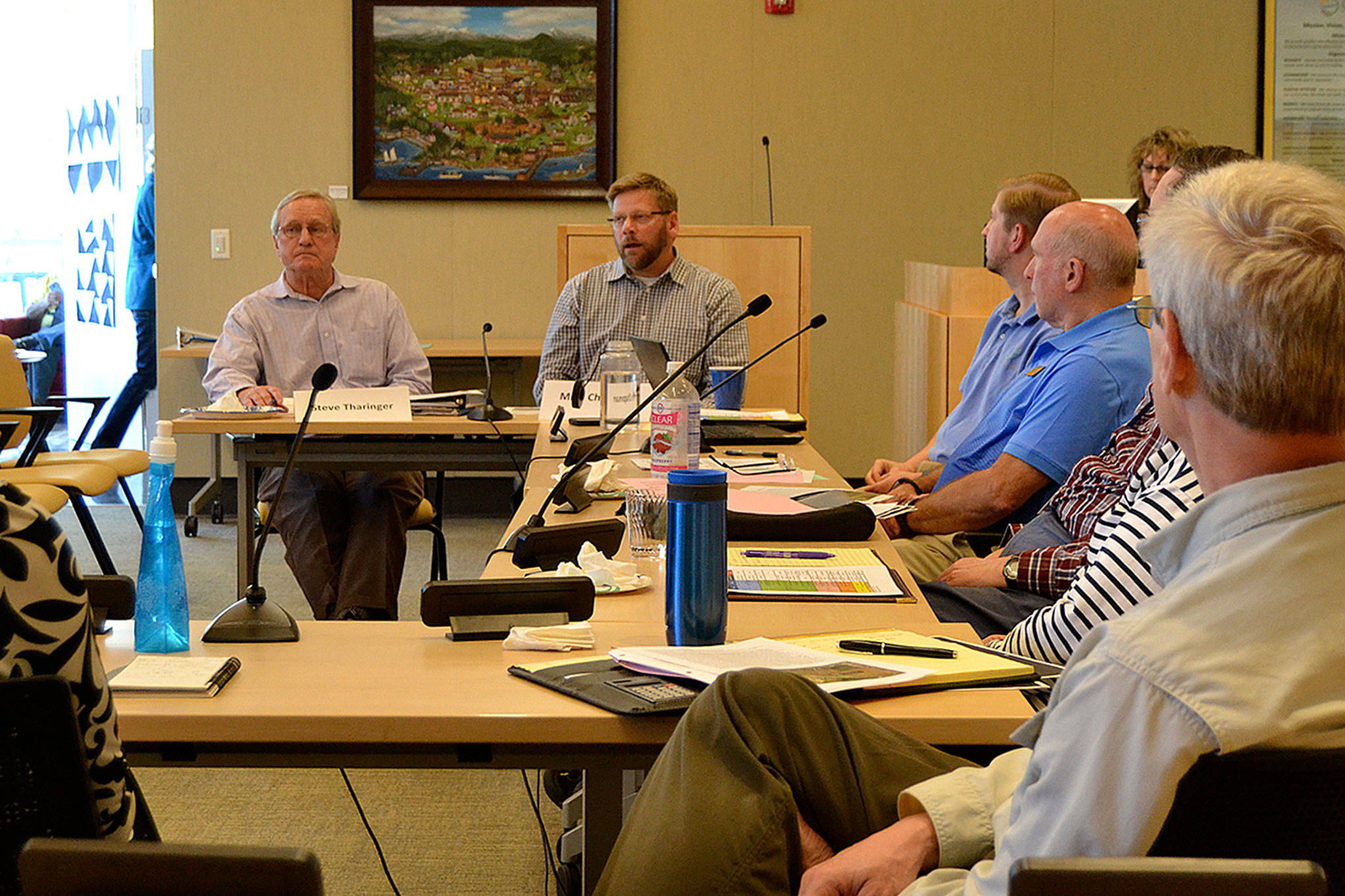SEQUIM — City officials hope that 24th District state legislators can help them finish the Simdars Road interchange off East Washington Street in the next legislative session.
State Reps. Steve Tharinger and Mike Chapman, both Democrats, heard city staff and council members’ legislative session agenda earlier this month in the City Council’s chambers, with improvements to U.S. Highway 101 at the top of their list.
“What it comes down to is access,” said David Garlington, Sequim Public Works director.
“For financial reasons it was built halfway [in 1999]. If you don’t build the whole thing out then it’s a problem that continues to exist.”
Assistant City Manager Joe Irvin said the interchange is included in the city’s new Economic Opportunity Zone where millions are being spent for road improvements to encourage light industrial business development.
“With Sequim Avenue being our only full interchange, it accepts a lot of trips to get to the east end of town,” he said at the June 11 meeting.
Garlington said the city is limited in what it can do with growing traffic demands at the Sequim Avenue/Washington Street intersection because there’s no space to widen lanes.
He told Chapman and Tharinger that Simdars “is prime for easy construction” with “a lot of opportunities to get this done at a relatively low cost.”
State Department of Transportation estimates put the interchange completion at around $7.4 million with inflation based on an earlier estimate, Garlington said.
Both Chapman and Tharinger told city officials they were aware of the proposed corridor project that includes safety improvements to multiple roads in the area, including Palo Alto and Happy Valley roads and Whitefeather Way.
Tharinger, of Sequim, asked about approaching them holistically including the interchange.
“Seems like it could be a great thing,” Garlington said. “In some ways, it reduces the overall cost. We have strong support from [Jamestown S’Klallam Tribe and Clallam County].”
City Manager Charlie Bush said the city is close to an interlocal agreement with the tribe about extending sewer services for a future resort.
Garlington said the agreement could be voted on in the next few months.
For all the area’s road improvements, Tharinger said it makes sense to the public to have a unified project.
“You’ll probably need to package it,” said Chapman, a Port Angeles resident who sits on the House Transportation Committee. “That’s one of the things [state Department of Transportation] will look at in a request.”
Garlington said as a whole, the corridor project could cost $10 million to $12 million to finish the interchange and make safer improvements to Palo Alto and Happy Valley roads.
However, he said the project would ideally include a frontage road to deter them from the highway for safer access, but it would cost more.
Tharinger asked Chapman if the city should consider asking for the interchange only or for the whole project.
“It’d be interesting to see if DOT wants the whole thing,” Chapman said. “I’m not so sure we shouldn’t ask.”
“I’d go for a full scale project and let our process edit it,” Tharinger said.
He added that including local dollars from funds, such as the Transportation Benefit District, helps with the decision process.
Public records, broadband
Other priorities for the city include re-evaluating water rights for cities to better meet the Growth Management Act and multiple issues sought by the Association of Washington Cities.
Bush said they removed a funding request for the third phase of renovating the Guy Cole Event Center’s breakout rooms because they found some local funding for the project.
City officials continued to ask legislators for public records reform.
“We, like most jurisdictions, are seeing more requests and more and more complex requests,” said City Attorney Kristina Nelson-Gross.
She said that the statute “may be good intentioned [but] it’s setting jurisdictions up.”
City staff said Sequim’s risk pool does not cover public information requests lawsuits.
Chapman said there was a lot of pushback on reform (leading to Gov. Jay Inslee’s veto of Senate Bill 6617).
“It didn’t work out so well for us,” he joked with City Council members. “I’m not sure if you want us to reform that for you.”
However, Chapman said he and Tharinger understand the costs for frivolous public information requests and that there are ongoing conversations about meeting those costs.
“Obviously, we want the records available,” Chapman said. “The city is probably on the forefront of this. I know it’s frustrating when you get a request for every document with the ‘City of Sequim’ name.”
Tharinger agreed there is a problem with the process.
“It’s always seemed to me you could just have a magistrate or a judge review what was the intent of the request,” he said. “The more you can put digitally, the more you can put in public access the less of a challenge there’s going to be.”
City officials and legislators discussed other items, including expanding broadband across the city and in rural areas, affordable housing and mental health support services.
“We still have a lot of things we have to get better at,” Tharinger said. “We have a huge lawsuit in place with hospitals that makes McCleary look like a walk in the park.”
Irvin said city councilors will consider the legislative agenda items this August or September to see if these projects remain priorities.
The 24th District includes Clallam and Jefferson counties and about one-third of Grays Harbor County.
For more on the city of Sequim’s legislative agenda, visit www.sequimwa.gov or call 360-683-4139.
________
Matthew Nash is a reporter with the Olympic Peninsula News Group, which is composed of Sound Publishing newspapers Peninsula Daily News, Sequim Gazette and Forks Forum. Reach him at mnash@sequimgazette.com.

